We ALL live in a watershed. The actions we take in our own homes often affect the streams nearby. Each of us can play a part in making sure the streams clean and healthy.
Do your part to keep pollutants out of streams:
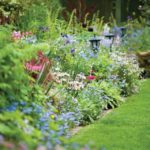 Practice natural yard care. Reducing fertilizers and pesticides is healthier for your family, and for the streams nearby.
Practice natural yard care. Reducing fertilizers and pesticides is healthier for your family, and for the streams nearby.
This Natural Yard Care website has amazing tips from professionals, and dates for workshops to learn more.
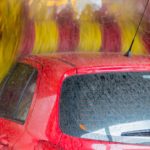 Wash your car at a commercial car wash — which will send water to a treatment plant to keep pollutants out of the local water.
Wash your car at a commercial car wash — which will send water to a treatment plant to keep pollutants out of the local water.
Or, wash it on a lawn, where the water can filter through soil instead of heading directly into a storm drain or the nearest creek.
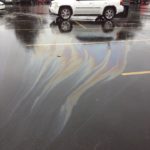 Check your car for oil leaks, and fix them quickly.
Check your car for oil leaks, and fix them quickly.
The Don’t Drip and Drive campaign has tips for inspection, and locations for where you can get a free leak inspection.
 Scoop your dog’s poop — bag it and put it in the garbage. Did you know that pet waste is filled with bacteria? It is not good for people or stream critters. Learn more here.
Scoop your dog’s poop — bag it and put it in the garbage. Did you know that pet waste is filled with bacteria? It is not good for people or stream critters. Learn more here.
Conserve water:
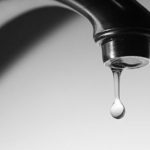 Use less water in your household. That way, more water can stay in the streams for fish. Great tips include:
Use less water in your household. That way, more water can stay in the streams for fish. Great tips include:
- Fixing leaky faucets and toilets,
- buying water-efficient appliances, and
- using rain barrels to store and water you garden.
Plant a rain garden:
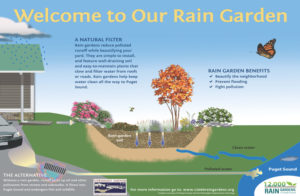 Rain gardens filter pollutants out of runoff from roofs and driveways. They also help slow water on its journey to the stream, to even out stream flow and reduce flooding.
Rain gardens filter pollutants out of runoff from roofs and driveways. They also help slow water on its journey to the stream, to even out stream flow and reduce flooding.
Local cities often offer for incentives on installing a rain garden.
12,000 Rain Gardens has a wealth of information on how to design, choose the right plants, and install a rain garden of your own. Or, it can help find a professional to do it for you.
Fish responsibly:
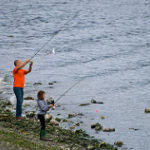 Follow all fishing guidelines and rules to avoid overfishing wild salmon, and practice proper catch-and-release protocol to avoid harming fish. Learn more here (pdf).
Follow all fishing guidelines and rules to avoid overfishing wild salmon, and practice proper catch-and-release protocol to avoid harming fish. Learn more here (pdf).
Get involved in your community:
Natural areas along streams and rivers are vital to salmon, often in Parks and other public areas. They take work to restore or maintain, and volunteers are often vital in this effort.
- Volunteer to keep weeds from taking over native areas. Ivy, blackberry, reed canary grass and other weeds often try to take over areas where native vegetation should be. Native plants do a better job of cleaning pollutants and providing food and shelter for a variety of wildlife. And native trees and plants along streams provide shade to keep water from being too warm for fish.
- Volunteer to plant trees. There’s nothing quite like the thrill of installing a new tree to provide years of habitat for native wildlife!
Living on the water
If you live along the water, you have even more opportunities to be a good steward of salmon. Actions you take to improve habitat and maintain clean water can make a difference in the habitat for these fish. Learn more about actions you can take if you are a:
To find out more information about how you can help salmon, visit these pages: